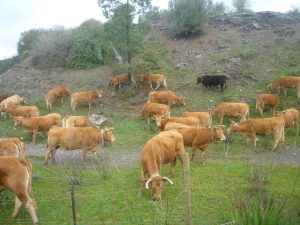COWS November ‘21,
Why do cows have four stomachs
Because they mainly eat grass
Their digestive tracts
Can cope with the facts
That they’ll eat what humans can’t ‘pass’!
And when we corral them inside
And feed them ‘fast food’ from a sack
Maybe it’s time to decide
That they belch and they poo
Much more than they’d do
When they’re grazing and free
To pass cow pats and pee
With the chance to put manure back!
I’ve repeated that poem because I read recently of the furore regarding tipping yogurt down the loo; because of an additive in the cows food that ‘significantly’ reduces the amount of methane emitted by cows producing said yogurt. I gather that ARLA ( the fifth biggest dairy company in the world and the largest producer of dairy products in Scandinavia and the UK) have taken over the company Yeo, which was, I assume, an organic producer, and are adding something called Bovaer, which supposedly reduces methane emissions by 27%.
I note that these hysterical reactions are not related to the effect on the cows digestion after consumption of this product, but rather to the assumed bad effects on the human digestion when consuming the yogurt produced; an assumption that has been completely denied by the manufacturers of Bovaer.
The product itself is made, using silicon dioxide, propylene glycol and 3-NOP, and is considered ‘harmful, by inhalation, to humans handling it’, but, ‘does not pose any food safety issues’; a direct quote from a professor at Queens University, Belfast. Not a mention of the effects on the cows, ingesting this stuff!
Meanwhile, on another planet, I read in the latest newsletter of one of my favourite websites, ‘WickedLeeks’ originally founded by Guy Singh Watson of Riverford Farms, that grass fed cows don’t produce as much methane, when fed on an 100% grass based diet. The following is a direct quote from the WickedLeeks website:
‘There is growing evidence that the dairy produced by cows fed on a 100% pasture diet has lower levels of saturated fat, higher levels of omega-3 fatty acids, and a greater amount of vitamins and minerals than grain-fed dairy. ‘
So, how do we disseminate these two seemingly contradictory statements? Well, firstly let’s look at what has not been said; mainly in press releases broadcast in the media. I’ve tried to find out/ confirm that the cows being fed Bovaer in their feed, are mainly housed in industrial dairy units, where the build up of methane is substantially increased when large numbers of cows are confined in a restricted space. Moreover, unless this manure is stored in ‘dry’ systems (piles of solids) as an alternative to ‘liquid’ systems (lagoons) it will give off more methane, because, if manure gets wet it starts the process of decomposition.
Which brings me neatly to information that I have gleaned off the website ‘A Greener World’; mainly from a comprehensive explanatory article titled ‘A Breath of Fresh Air’; and subtitled ‘The Truth about Pasture based Livestock Production and Environmental Sustainability’.
I would recommend that anybody with an interest in this subject should read this article in full. I however, will just catalogue the main points that I have taken from reading the whole thing.
1st Quote: ‘Liquid manures from grain fed cattle will emit more methane than manure deposited on pasture by grazing animals’
Further explanation of this; when pasture fed cows deposit their poo on grass, this encourages carbon sequestration (the natural process of transferring CO2 from atmosphere into soil) because they trample it in as they graze; thereby spreading it about, and stimulating plant growth.
2nd Quote: ‘The world’s soils are the largest terrestrial reservoir of carbon; containing three times as much carbon as the atmosphere, and five times as much as the world’s forests’
Factual clarification: There are claims that grass fed cattle emit more methane than the intensively reared variety. The phrase that does not get pride of place in these statements is ‘in their lifetime’. Grass fed cattle grow more slowly and take more time to achieve slaughter weight than intensively reared stock; hence the statistical difference.
3rd Quote: ‘Today intensively raised livestock are in direct competition with humans for high energy crops, such as cereals’
Further explanation: Grass fed cattle do not require corn and soy based feeds, which are often grown elsewhere and trucked in; adding to their carbon footprint.
I remember a glaring example of this ignorance of good husbandry during Covid, when farmers in, I think, the mid west of The USA started to spread their animal waste on the fields; because they couldn’t get it taken away, as was the usual practice; a service for which they paid! I expect, for quite a few, the penny dropped that manure was liquid gold for the land, when their soil reaped the benefits with abundant plant growth, produced from this free and natural nutrient.
So, to wind this post up, I would suggest that, once again, human interventions, with obfuscation and false assumptions, are trying to ‘improve’ on nature based systems that have already shown their worth and viability. And, be aware that I haven’t even mentioned pig and chicken production. That’s another whole new horror story!

We’re relatively lucky in West Wales, where cattle is the main kind of farming. They’re in sheds in the winter and out on fields in the summer, with the exception of a few ” mega diaries” where they’re in all year. Even so, most farmers still feed a soy- based supplement to speed up the growth, feeling the pressure from supermarkets to supply cheap meat.
Thank you Jackie for a well presented argument.
Totally in agreement but not sure Yeo Valley are baddies in this. Their website insists that despite a partnership with Arla organics they still follow the Soil Associations rules i regarding additives to maintain their organic status.
Do hope do as I am addicted to their yoghurt!!
I think Yeo Valley are more victims than baddies; yet another successful business being gobbled up by a bigger conglomerate. Victims of their own success as you might say!
And the same thing is happening wherever you look. You can’t argue with the bottom profit line. So, enjoy that yogurt with a clear conscience!